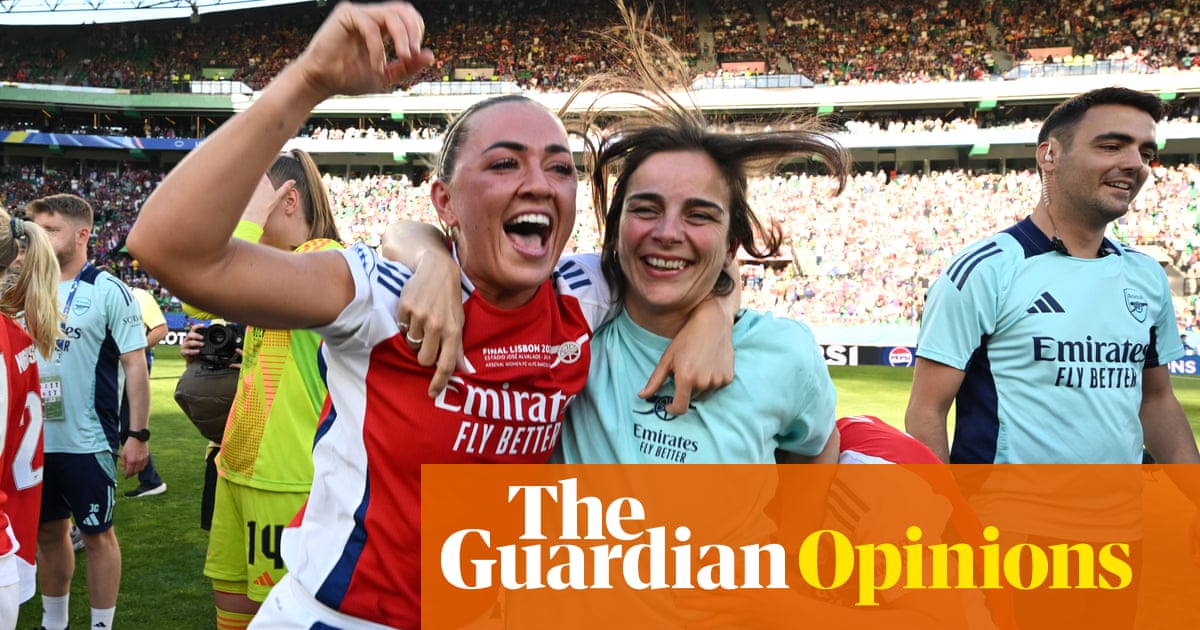Ican’t type the words. Sophie Downey’s stopwatch, started the moment the clock hit 90 minutes, is running on the desk next to me, but my fingers won’t move. I refuse to write a variation of“Arsenal are European champions”with time still on the clock because the thought of having to press that backspace key and delete it is too much. The editors will have to wait; I’ll start writing the intro paragraph when there’s one minute 30 seconds of the seven minutes of stoppage time to go, but gingerly, agonisingly – even that feels too soon.
I believe, I really do, but what if? And then I’m too busy sobbing into my hands to finish or press send. The narratives, there are so many narratives:Renée Slegers, the former academy player head coach with the retro Arsenal ring on her little finger who was made permanent manager only four months ago; Leah Williamson’s journey from being a mascot at a European Cup final to playing in one; Chloe Kelly’s salvaged season; Beth Mead’s emotional turmoil; Mariona Caldentey making it three in a row after winning the past two with the now vanquished Barcelona; Kim Alison Little. Where to start? Where to end?
My first report, sent not quite on the whistle, is rushed but I don’t really care. What does this mean? Everything.
Williamsonhas said she now felt ashamed for having previously put “trophy for England over trophy for Arsenal”, because the feeling last Saturday was “the happiest I’ve ever been in my whole entire life”. The lifelong supporter of the club said she hoped “that other Arsenal fans are happy too”. Understatement of the century, Leah, understatement of the century.
The England captain had said she had been reflecting on her journey and reconnecting with those who helped her get to where she is today after the trophy lift outside the Emirates Stadium on Monday morning, and that chimed. Her journey from fan and academy player to Champions League winner is something few can relate to, but her undying love for Arsenal is more understood and she is not the only one who will have been reflecting on their relationship with the north London club this weekend. Remembering adds to the emotion of the occasion and triggers it.
My own journey started when a smile was actually wind, my arms and legs manoeuvred into a little flannel babygrow that had the badge on the front and “Arsenal babe” across the back. The earliest memories I have come in flashes across a weekend in Lisbon; then kicking a green translucent plastic ball with white flecks against the wall while I watched Arsenal Ladies play opposite my council estate in Shoreditch Park; finding out the score of the 1998 men’s FA Cup final viaa smuggled radio on a school trip; buzzing as I headed to a two-week Arsenal Foundation course on designing a magazine on QuarkXPress in the school holidays; winning a McDonald’s competition to kick penalties on the pitch at Highbury on the final day of a season; staying the night at the home of a family member who lived a stone’s throw from Islington town hall so I could get as close to the Invincibles trophy parade as possible; going to football sessions at school only to find them being led by Faye White and Rachel Yankey; the “Arsenal win the World Cup” Mirror front page Blu-Tacked to my wall after France’s 1998 men’s team’s triumph. Could I fill this piece with the memories? Yes, probably five times over.
Plenty of journalists choose to keep their personal allegiances private and having decided not to do that I can very much understand why (thanks, social media), but why should I hide or reject my fandom when my love of Arsenal is why I stumbled into this industry, having not ever considered it as something I could do, in the same way aspiring to be a professional footballer was a pipe dream for so many girls my age?
My fandom and my journalism are very separate things to me; if anything, I’m most critical of the club I adore because I want to see it do things right. As a journalist, you build bonds and relationships with players and staff across clubs and national teams. I struggle to think of a time I’ve interviewed a player and not come away wanting everything good to happen to them, for them to have their drive, work and passion rewarded. There isn’t a Women’s Super League team I dislike, not even Tottenham, because, while I’ll never fully understand what it takes to be a professional footballer, I’ve been given an insight into that world; the highs, the lows, the injuries, the emotional and mental tolls, the hidden battles, the fight for professional standards and respect and more. But there will always be one team I love, love with a passion fuelled by those memories that flitter in and out.
That is why there has been a lot of personal emotion this week. Hell, I’m crying periodically while I write. Arsenal gave me a way to experience collective joy and pain, to share a deep emotional bond with my dad, to feel connected to my community and a career. The feeling of watching a women’s team that played for a short while in the park opposite Clinger Court on Hobbs Place Estate go on to lift the Champions League, in the modern era, in a packed Estádio José Alvalade, and be celebrated by more than 10,000 fans within 48 hours, after pioneering the game for so long, is indescribable – though I’ve tried. So, forgive the slipping of the journalistic cap in the aftermath, the blurring of the lines as the fan in me seeps out a bit, because if I didn’t feel all this, I wouldn’t be doing this job.
